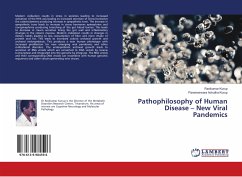The viral pandemics have contributed to human evolution. Virus and bacterial infection homogenized human population by gene transfer. The archaeal and its RNA viroids form the lynchpin of the mechanism of gene transfer. This leads on to globalisation of speech, thought and culture by viral epidemics and related gene transfer. Human viral epidemics are necessary prerequisite for the evolution of human culture. The viral epidemics homogenize human population forming groups of caste, religion, nationalities and culture. The archaeal RNA viroidal quasi-species consortia underlie this mechanism of evolution. Thus viral diseases contribute to culture, behavior, diet, eating habits and sexuality. Thus virus mediated gene transfer is important human sociological mechanism. The archaeal RNA viroidal quasi-species consortia and its recombination with unrelated RNA and DNA viruses and its integration into the human genome by HERV reverse transcriptase forms the basis of this phenomena. Retroviral infections have contributed to the genesis of schizophrenia, cortical function and evolution of consciousness. Viral pandemics thus contribute to population identity and differences.
Bitte wählen Sie Ihr Anliegen aus.
Rechnungen
Retourenschein anfordern
Bestellstatus
Storno








